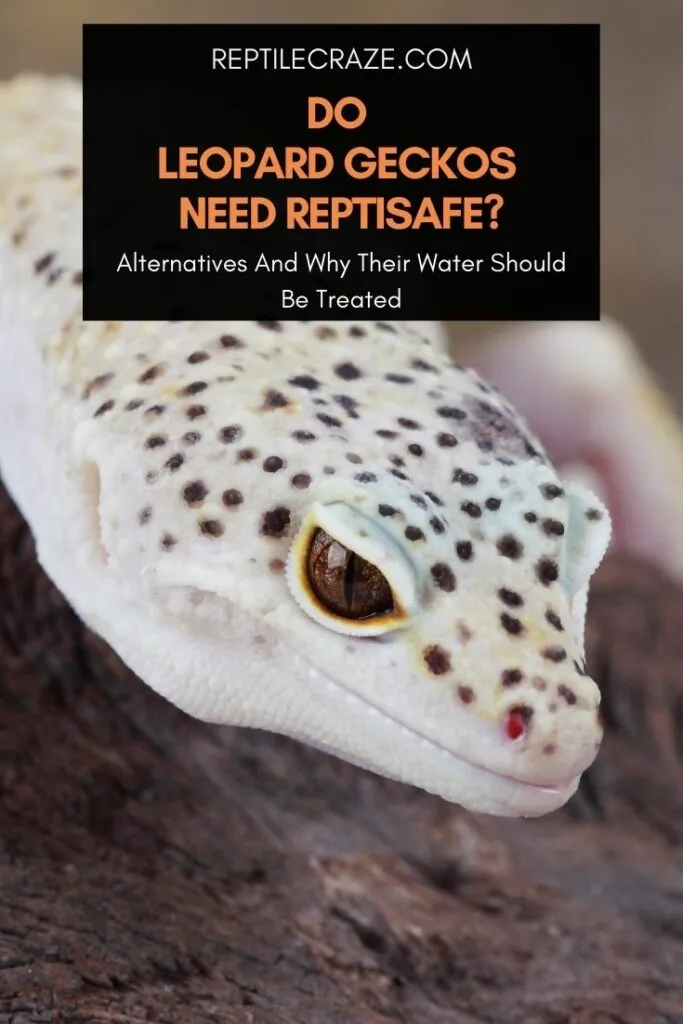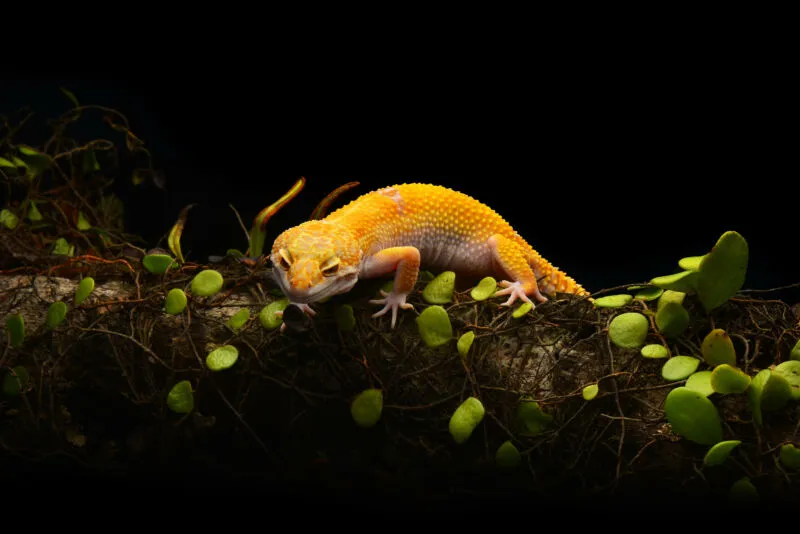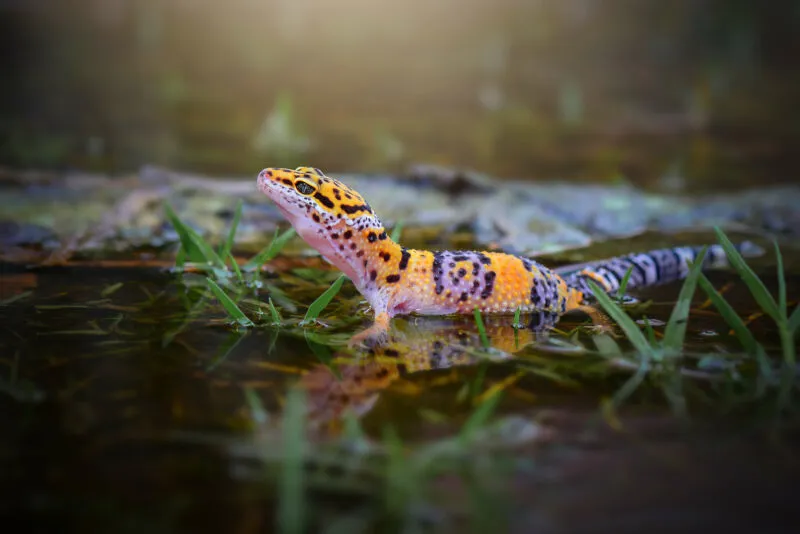
Leopard geckos have important water needs, but I often tell new pet owners that “water isn’t just water”. The type of water you give to your leopard gecko can significantly impact its health if it is contaminated. Reptisafe is a water conditioner advertised to make water safe for lizards, but is it really needed?
Leopard geckos don’t need Reptisafe as long as their drinking water has been made safe through other means such as filtration or distilling. However, Reptisafe is a good option for those who do not have the time or equipment to distill or filtrate water.
Read on to find out about how Reptisafe works and what other ways are available to make water safe for your leopard gecko.
Table of Contents
Why Is Reptisafe Not Essential?
Reptisafe is designed to remove anything harmful from your leopard gecko’s water before he/she is exposed to it. It’s a chemical mixture known as a water conditioner.
It does this job well. However, there are other, albeit slower, techniques to condition water that does not require the use of chemicals.
Reptisafe is not essential for any leopard gecko owner as long as you have other means to remove bacteria and contaminants from water.
These techniques include:
- Other Water Conditioners
- Distilation
- Filtration
- Evaporating and Boiling
All this being said, Reptisafe is an excellent way to make drinking and bathing water safe for leopard geckos. It’s fast, too! But there are some things Reptisafe can’t do, and this becomes a concern if your tap water is of low quality.

Can I Give my Leopard Gecko Tap Water Without Reptisafe?
If only it were that simple! The truth is that some tap water sources will be fine for your leopard gecko. However, tap water quality varies drastically between countries and even regions.
It’s estimated that 1 in 3 people do not have access to clean drinking water. Even in countries where the drinking water is thought to be safe and well-treated with chlorine, problems can occasionally be found such as:
- Harmful parasites like cryptosporidium have developed high-chlorine tolerance.
- Bacteria such as salmonella typhi have been found in normally clean water sources by the CDC in the US.
- Heavy metals like cadmium, zinc, and even lead, have been found in drinking water in countries with good water and sewer infrastructure. These metals can have significant health consequences.
- Other pollutants from mining, fracking, and sewage.
But, hey! I’m not trying to terrify you from drinking tap water. Most of the time it will be fine, but then you’ve probably been drinking and cooking with it for your entire life, so you have come to tolerate the water in your neighborhood.
Your leopard gecko has no such water tolerance!
So, while your tap water is probably fine for your leopard gecko, it’s important to treat the water just to be sure.
The takeaway is: Tap water, when treated using one of the water treatment techniques we’ve mentioned, should be perfectly safe for your leopard gecko.
What About Chlorine?
It’s not just contaminants that you have to worry about when giving your leopard gecko water. What about the chemicals used to make the water safe for human consumption?
Chlorine is a chemical used to make tap water safe to drink. It sterilizes the water, killing most parasites and bacteria.
It’s widely believed that chlorine is safe for humans and larger animals when mixed with drinking water because the amount used is so small (usually between 0.2mg/L and 0.5mg/L).
Vets have known for a long time that chlorine causes neurological and other problems in pet fish; however, no studies have been carried out on potential lizard toxicity.
Most leopard gecko owners haven’t reported any issues with chlorine in tap water, but this can’t be confirmed as of yet.
Reptisafe will remove chlorine from water if this is something you are concerned about.

How Does Reptisafe Make Water Safe For Leopard Geckos?
Reptisafe uses a dechloraminating agent. This is different from dechlorinating agents like sodium thiosulfate. Both inactivate chlorine within minutes, but sodium thiosulfate has been shown to cause issues for some animals.
Reptisafe is, therefore, better for long-term health than common water conditioners. Also, Reptisafe adds ions and electrolytes into the water, increasing hydration for newly acquired animals.
Reptisafe also removes:
- Chloramines: A less common chemical found in drinking water.
- Ammonia: Nitrogen based compound that can be harmful to animals when in water.
- Nitrates: The least harmful of the nitrogen based compounds created through animal waste, but still not a healthy thing to have in the water, should it be contaminated by accident.
It should be noted here that Reptisafe will not remove any heavy metal contamination if present. You’ll need a better water source or an alternative to Reptisafe if your tap water is compromised in this way.
Best Alternatives to Reptisafe
While Reptisafe is a great product for removing chlorine, ammonia, and nitrates, it can’t be deemed essential, because there are other ways to make water safe for your leopard gecko. Some of them will also treat chlorine and heavy metal contamination.
Other Water Conditioners
There are a number of other water conditioners designed with reptiles in mind. These include:
- Terra Aquatize
- ReptoSafe
- Betta H2O Conditioner
Despite this, Reptisafe is easily the most commonly used brand.
Filtration Systems
Filtration systems come in all shapes and sizes. Like Reptisafe, they can remove chlorine and some other contaminants. These are usually quite affordable.
Another advantage is, you can filter your own drinking water as well, removing chlorine and bacteria from it.
For removing heavy metals, you’ll need a good reverse osmosis water filter. These are expensive, but they can remove almost anything from a water supply, even lead. But, hey, you probably don’t need anything like this, unless your tap water is severely compromised.
Distilled Water
Distilled water is completely safe for leopard geckos. It is also an excellent way to remove almost everything harmful that might have found its way into your water. This includes most pesticides and heavy metals.
One word of caution is that this will remove all mineral content from the water. Many animals use the trace mineral deposits in water to assist with their health. However, leopard geckos get most of their mineral intake from
If you want to use distilled water, but you’re worried about this mineral loss, be sure to supplement your leopard gecko’s diet with a little calcium.
Another interesting idea is to mist the
It’s easy and cheap to make distilled water at home, here’s a helpful video on how to do it:
Evaporation and Boiling
That’s right, if you’re only concerned about the chlorine content, you can remove it by boiling the water for 15 minutes and then letting it cool.
Evaporation works too! Leave the water in your refrigerator for 24 hours. Keeping it cool will slow down any bacteria growth, should anything get into it once the chlorine is gone.
Conclusion
I hope this article helped you decide whether to use Reptisafe for your leopard gecko’s drinking water or not. Reptisafe is very convenient and only takes minutes to work, but I wouldn’t consider it essential, simply because there are other ways to make water safe.
If you have any experiences with these water treatment techniques, I’d love to hear about them in the comments section below.
- Enchi Ball Python: A Unique and Stunning Morph of Python regius - March 27, 2025
- Emerald Tree Monitor: The Enigmatic Green Guardian of the Rainforest - March 26, 2025
- The Egyptian Cobra (Naja haje): A Fascinating Serpent - March 25, 2025
